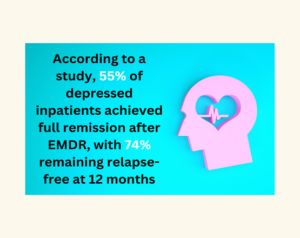Are you struggling with depression, feeling trapped in a cycle of hopelessness? You’re not alone. According to the National Institute of Mental Health, an estimated 21 million adults in the United States experienced at least one major depressive episode in 2020. At Archway Behavioral Health, we offer comprehensive depression therapy to help you reclaim your life. Our expert therapists utilize evidence-based approaches to address your unique needs. Whether you prefer one-on-one sessions, group therapy, or more intensive options like our intensive outpatient programs (IOPs) or partial hospitalization programs (PHPs), we’re here to support your journey towards healing and renewed hope. Take the step toward reclaiming your life and health—contact us at (888) 488-4103.
Cognitive Behavioral Therapy for Depression
Proven Effectiveness
Cognitive behavioral therapy (CBT) has been found to be as effective as antidepressant medications for treating depression, with a medium effect size. When delivered by experienced therapists, even patients with severe depression can benefit from CBT to the same degree as medication. According to research, combining CBT with antidepressants can further enhance outcomes, especially for chronic or treatment-resistant cases.
Enduring Benefits
A key advantage of CBT is its enduring effect that helps prevent relapse after treatment ends – potentially comparable to continuing medication. Adding CBT as a continuation or maintenance treatment after initial medication can significantly reduce relapse rates, particularly for higher-risk patients. This makes CBT a valuable long-term investment.
Cognitive Restructuring
CBT for depression focuses on identifying and changing negative thought patterns that perpetuate low mood. Therapists guide patients to challenge distorted beliefs about themselves, their circumstances, and the future. Techniques like journaling, gratitude exercises, and mindfulness help cultivate more balanced perspectives.
Dialectical Behavior Therapy for Depression
Dialectical behavior therapy (DBT) combines acceptance and change strategies to help manage depressive symptoms more effectively. DBT has shown a 71% remission rate for chronic depression in older adults when used with antidepressants.
Core DBT Techniques
- Mindfulness: Staying grounded in the present to avoid negative thought spirals.
- Emotional Regulation: Identifying, understanding, and modulating feelings.
- Distress Tolerance: Coping mechanisms like radical acceptance for acute distress.
Benefits for Depression
DBT empowers individuals to take control of negative thoughts and emotions. Its skills enhance interpersonal relationships and communication – crucial for battling depression. Mindfulness practices disrupt the cycle of depressive thinking.
Mastering DBT’s toolkit provides resilience, hope, and a life worth living. Many see positive results within 12 weeks of this specialized cognitive behavioral therapy.
Eye Movement Desensitization and Reprocessing for Depression
EMDR (Eye Movement Desensitization and Reprocessing) therapy can effectively treat depression by reprocessing traumatic memories that contribute to depressive symptoms. According to a study, 55% of depressed inpatients achieved full remission after EMDR, with 74% remaining relapse-free at 12 months.
Rapid Processing of Trauma
EMDR guides the brain to rapidly process unresolved memories through eye movements, reducing negative emotions and disturbing images. Compared to CBT, it involves less trauma exposure yet shows faster effects in many studies.
Holistic Healing Benefits
By targeting the root cause of adverse experiences, EMDR can alleviate various psychological and physiological symptoms beyond depression. Its benefits extend to chronic pain, stress disorders, and supporting overall patient wellbeing.
Group Therapy Provides Support for Depression
Combating Isolation
Depression often leads to isolation and withdrawal, exacerbating the condition. Group therapy helps combat this by facilitating social interaction and shared experiences with others facing similar challenges. Finding motivation can be difficult, but group settings provide support and accountability.
A Supportive Community
Sharing experiences in a group allows people with depression to connect with others who understand the struggles, fostering a sense of community and reducing stigma. This shared understanding and the ability to learn from diverse coping strategies can be more beneficial than individual therapy alone.
Cost-Effective Treatment
Group therapy is an effective, cost-efficient treatment method that allows multiple patients to be treated simultaneously. It can be structured in various formats like skills development, cognitive-behavioral or support groups to meet individual needs while leveraging group
Intensive Outpatient Programs for Severe Depression
A Comprehensive Approach
Intensive outpatient programs (IOPs) offer a structured and comprehensive approach to treating severe depression. These programs provide intensive mental health services without requiring hospitalization, making them an accessible option for those facing geographic or logistical barriers to treatment.
Proven Effectiveness
Studies have demonstrated the effectiveness of IOPs in reducing symptoms of depression, anxiety, and substance abuse disorders. One study found that over 50% of participants in a remote IOP crossed below the clinical cutoff for major depressive disorder after treatment.
Multimodal Therapy
IOPs typically incorporate various evidence-based therapies, such as (CBT), exposure therapy, and medication management. This multimodal approach addresses the complex nature of severe depression, targeting multiple aspects of the condition for a comprehensive recovery.
Frequently Asked Questions About Depression Therapy
What is depression therapy?
Depression therapy refers to various psychotherapeutic approaches used to treat major depressive disorder and related conditions. According to SAMHSA, common therapy types include cognitive-behavioral therapy (CBT), interpersonal therapy, and psychodynamic therapy. These evidence-based treatments aim to help individuals manage depressive symptoms, improve daily functioning, and enhance overall well-being.
How effective is therapy for depression?
Studies show that therapy can be highly effective for treating depression. Intensive outpatient programs (IOPs) have demonstrated significant reductions in depression (39%), anxiety (34%), and improvements in overall well-being (64%) on average. Therapy provides foundational skills to work through challenges and establish personalized treatment goals.
Conclusion
As you embark on your journey to reclaim your life from depression, remember that effective treatment options are available. With depression affecting over 280 million people worldwide, you’re not alone in this struggle. Archway Behavioral Health offers a comprehensive range of therapies, including CBT, DBT, EMDR, and trauma-focused therapy, tailored to your unique needs. Whether you choose one-on-one sessions, group therapy, or participate in intensive outpatient programs (IOPs) or partial hospitalization programs (PHPs), professional support is within reach. Take the step toward reclaiming your life and health—contact us at (888) 488-4103. Your path to recovery starts here.



